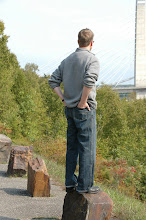How's Your Day Going?
Just in case you were starting to feel good about your day, check out this site. This site aggregates disasters around the world and plots them with cool iconography onto a map of the world. Scroll down to get more detail on each event. Who knew, just today in the US we have had an explosion, a chemical accident, and an outbreak of Murine Typhus.
Organic AND local?
According to a post on Treehugger, the Soil Association (one of the UK's organic certification bodies) is considering adding shipping to their list of considerations to determine whether or not something is organic. In this instance, they are considering removing the organic label from any produce that air freighted on the idea that the pollution created to ship the organic produce all those miles eliminates any benefit of having grown it organically in the first place. I wonder if the USDA could be so enlightened? (HA! Not a chance if Wal*Mart, unWholeFoods, EdenFarms, and the like have their way would be my guess. Just think of it--what would unWholeFoods do if it couldn't ship organic garlic from China to New York?!?).
Still, it is good to see someone thinking more about the organic label. Organic, at least in the US, has come to mean nothing more than "chemical-free" (and not always that), and any sense of the original local, sustainable, and small, that the organic movement first had have disappeared.
A digression: my food today? Local bread--as in out of my own oven local.
"Eat food. Not too much. Mostly plants"
In tomorrow's New York Times magazine (one advantage of getting the NYTimes in New York is that you can get the Sunday sections on Saturday!) is another article by Michael Pollan from which I quote my post's title, "Eat food. Not too much. Mostly plants." A sentiment that pretty much sums up my own food philosophy if you understand (as Pollan does) food to mean whole, unprocessed food. Not too much--I've never been a fan a gorging myself. An mostly plants--I've always had a vegetarian bend. I think I would also add local: eat local food.
What is most relevant about Pollan's article is his insight that somewhere in the 70s and 80s we started seeing food through a lens of science and that food could be broken down into some basic parts (nutrients, vitamins) and reassembled with no loss of any health value. It reminds me of the magic pill that we were all promised in the 70s that would replace eating altogether. Or was that Tang?
Of course, the difficult part is, as Pollan is quick to point out, how to eat other than industrial food. Difficult, but not impossible. Today's shopping trip: beef, spicy lamb sausage, black radishes, potatos, turnips, and three kinds of cheese, all from local producers.
UnWhole Foods
I'm growing to really dislike Whole Foods. Don't get me wrong--it's a lovely store. The food (especially produce) is exquisitely displayed, everything is very fresh and very tasty. But it is also horribly expensive, crawling with children-laden suburbanites, and has moved far, far away from any ideal of "whole foods" that it once tried to live up to.
For quite some time, I've had the idea in my head that something was wrong with the organic food market, and health-food market, and that food as described by "slow food" and local food movements provided a deeper alternative. Yet, I have also found that I have ideas about what (I think) is right and what I would like to be doing far sooner than I really fully understand them.
But the more I spend thinking about the differences between a place like Whole Foods (something Michael Pollan calls industrial organic) and locally & sustainably grown food, the more I really start to see and feel the difference. I've shopped at food co-ops and alternative health food stores for years (decades, really) and it is sad to see how so many of the alternatives have disappeared or become something else. Just this morning, while at Whole Foods (yes, I still shop there) looking for garlic, I found some. Organic even. But grown in China! Why would I want garlic that had to travel 7000+ miles (or whatever the distance). And then there was the beef. Organic beef. Reasonably priced. Tasted very good--especially as part of the Nachos we had for lunch. But then I started thinking back to Michael Pollan's book and his tracing of the corn industry in America.
What stuck in my brain was his spectrometer analysis of a fast food meal. On the surface the meal was a varitable breadbasket of diversity: burger, cheese, bread, dressing, soda, fries. But once he ran the meal through the spectrometer he could determine that the vast majority of the meal was derived from corn. And so I stood in Whole Foods wondering if the organic beef I was about to buy was really just the by-product of the well oiled corn industry that we have going on here in America.
At least the tortilla chips didn't hide their corn nature . . .

